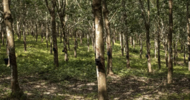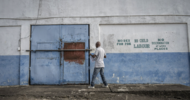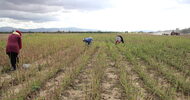IPS | 22 April 2010
Soumaila T. Diarra
Farming rice in Mali: local communities have mixed feelings about large, foreign-owned agricultural enterprises along the Niger.
BAMAKO, Apr 22 (IPS) - Domestic and international investors are taking over increasing amounts of arable land in Mali.
In the Macina commune of south-central Mali, a giant irrigation canal is in the final stages of construction. Libya is in the process of developing 100,000 hectares of land it has leased adjacent to the Niger River.
"The Libyans will have access to the area for 50 years under a lease agreement they signed (in 2008). The facilities they built will allow them to produce 200,000 tonnes of hybrid rice per year," Augustus Drago told IPS.
Drago directs the work of a government agency responsible for administration of the flat, swampy rice-growing area in the Interior Delta of the Niger River. His Office du Niger oversees the activities of over 56,000 small farmers, amongst them 2,370 women, who pay annual irrigation fees according to the volume of water consumed.
Domestic and international investors are taking over large tracts of arable land in Mali. Drago's agency manages approximately two million hectares of arable land, of which only 83,900 hectares are developed. This might suggest that there's plenty of land to lease for big agricultural projects, but local farmers are worried.
Saudi Arabia and the Community of Sahel-Saharan States (CEN-SAD) - including Libya - and Senegal are among the countries that want to develop large farms in Mali.
"The Senegalese campaigned for a long time for access to land. We offered them 25,000 hectares, but then we heard nothing from them for a long while (since 2005)," said Kassoum Denon, who oversees rice-growing areas at the Office du Niger, told IPS.
On the site of Libya's project, youth from surrounding villages welcome an investment that has provided them with jobs. "Most young people from villages in the area have found work thanks to this construction site. Afterwards people will be able to work in factories and building irrigation networks," Adama Coulibaly, a youth from the village of Kolongo, told IPS.
In addition to growing rice, Libya is considering adding industrial livestock production of 25,000 tonnes of meat per year. Its also promising to invest in local agricultural processing facilities for products such as tomato paste.
However, farmers' organizations worry that the project violates certain rights of villages along the canal site. A national coalition of small farmers' associations, CNOP (la Coordination nationale des organisations paysannes du Mali criticised the Libyans after visiting the site in July 2009.
"Local people are not well informed about the project. For example, we do not know when or how small farmers who have been displaced from their villages and fields will be compensated," said Lamine Coulibaly, head of communications at CNOP, in an interview with IPS.
"Mali leases the land to those who offer the best opportunities," said Drago. "You've seen the Libyans' construction site. We have to face the facts: after 50 years of independence, Mali has not been able to do that, and we could go another 50 more years without being able to do so."
Libya has spent some 52 million dollars building giant, 45 metre wide canals, according to the Office. Better yet, they paved the roads of nearby villages, and investors create jobs for youth in the area, working on construction sites and later in irrigation development.
"This will bring nothing but good to Mali. We will be able to develop an additional 100,000 hectares ourselves thanks to the initial canalwork done by the Libyans," said Drago.
And it's not just foreign investors who are scrambling to secure land in this fertile, well-watered area. Wealthy Malians have taken advantage of favourable regulations to take over a number of parcels of land for almost nothing. "This is because it is easy to have a plot. The bidder doesn't pay anything, but funds the socio-economic studies and development costs," said Moustaph Maiga, head of communications at the Office.
However, the inaction of many of these would-be investors has started to annoy the Office du Niger's admnistration. "I want to publish a list of all those who have not invested in their plots, but I'll give them a grace period for 2010," said Denon.
The Malian government encourages private investment in the area although it doesn't directly benefit from it. This policy is based on a new law passed in 2006, whose goal is to modernise the agricultural sector.
"Because of the current grain crisis, all of Mali's partner countries look to the Office du Niger. We must therefore use this crisis to achieve what we could not do before," said Drago.
The area produces mainly rice and sugarcane. But the Office administration is now encouraging farmers to produce during the off-season crops such as potatoes and other vegetables. The government profits indirectly from these initiatives via irrigation access fees.












